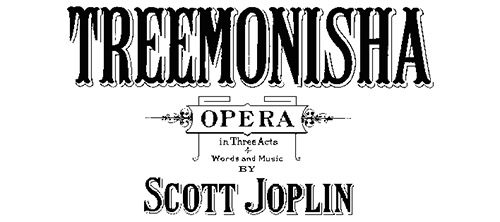Pas de biographie disponible.
Compositeur Musique additionelle Librettiste Parolier Metteur en scène Chorégraphe Producteur création Producteur version

Musical
Musique: Scott Joplin • Paroles: Livret: Scott Joplin • Production originale: 1 version mentionnée
Dispo: Résumé Génèse Liste chansons
L’histoire parle de Treemonisha, la seule femme afro-américaine instruite d'un village, qui pouesse les villageois à sortir de l’ignorance. La morale de Joplin est que voyant les problèmes des communautés afro-américaines il croyait que l’égalité raciale viendrait avec l’éducation. On peut faire l'analogie de Treemonisha avec la Flûte enchantée de Mozart dans laquelle la connaissance et la sagesse de Zarastro sont opposées à l'obscurantisme de la Reine de la nuit : ici, une centaine d'années après Mozart, c'est aussi l'éducation qui est opposée à la superstition et à l'obscurantisme.
Genèse: Tout le monde connaît Porgy and Bess, ne serait-ce que par « Summertime », opéra noir d’un compositeur blanc (mais juif). Personne ne connaît Treemonisha, premier opéra écrit sur des noirs par un noir. Le Châtelet, que l’on devrait rebaptiser Théâtre américain de Paris depuis l’avalanche de musicals qu’il a déclenchée, le monte avec courage en première française. Scott Joplin, l’enfant terrible du ragtime, claviériste funambule, s’était déjà frotté à l’Opéra, avec une partition que l’on n’a jamais retrouvée, A Guest of Honour (1903), et qui connut une seule représentation privée par la très fugitive - ségrégation oblige - Scott Joplin Drama Company. En 1907, Joplin résolut de s’installer à New York, espérant en Broadway. Las, son second ouvrage lyrique connaîtra le même sort : une représentation privée en 1911, quatre années après que la partition ait été achevée. Ce second échec brisa toutes ses ambitions de compositeur et hâta sa mort, deux années plus tard, plongée dans la démence syphilitique. Treemonisha fut un échec pour Scott Joplin car les Noirs n'allaient pas à l'opéra et les blancs ne voulaient pas aller voir un opéra écrit pour les Noirs. Sa fille réussit à le faire enfin monter, en 1972 pour la première fois au Morehouse College à Atlanta. La première représentation complète professionnelle date de 1975 par le Houston Grand Opera dont la ournée passera à l'Uris Theatre de Broadway.
Résumé: Treemonisha takes place in September 1884 on a former slave plantation in an isolated forest, between Texarkana, Texas (Joplin's childhood town) and the Red River in Arkansas. Treemonisha is a young freedwoman. After being taught to read by a white woman, she leads her community against the influence of conjurers, who are shown as preying on ignorance and superstition. Treemonisha is abducted and is about to be thrown into a wasps' nest when her friend Remus rescues her. The community realizes the value of education and the liability of their ignorance before choosing her as their teacher and leader. The opera opens with Zodzetrick, a conjurer, attempting to sell a bag of luck to Monisha ("The Bag of Luck"). However, her husband, Ned, wards him off. As Zodzetrick slinks away, Treemonisha and Remus hear the folks singing and excitedly prepare for the day ("The Corn Huskers"). Treemonisha then asks if they would like a ring play before they worked. They accept, and Andy leads the folks in a song and dance ("We're Goin' Around"). When the folks have finished dancing, Treemonisha notices that the women wear wreaths on their heads, and she herself tries to acquire one from a tree ("The Wreath"). However, Monisha stops her in her tracks, and tells her of how this certain tree is sacred. Monisha performs an aria, talking of Treemonisha's discovery under the tree ("The Sacred Tree"). Treemonisha is distraught to learn Monisha and Ned aren't her true parents and laments over it ("Surprised"). Monisha then tells of how Treemonisha was brought up and educated ("Treemonisha's Bringing Up"). Parson Alltalk then arrives in a wagon, talking to the neighborhood and confirming their belief in superstition. Whilst he distracts the folks, the conjurers kidnap Treemonisha ("Good Advice"). Once Alltalk leaves, the neighborhood realizes Treemonisha is gone ("Confusion"). Remus sets out to rescue Treemonisha. Act 2 opens with Simon, another conjurer, singing of superstition ("Superstition"). Zodzetrick, Luddud and Cephus then debate on Treemonisha's punishment for foiling their plans earlier in the day ("Treemonisha in Peril"). Whilst Treemonisha is bound, strange creatures perform a dance number about her ("Frolic of the Bears"). Simon and Cephus then take Treemonisha to be thrown in a giant wasps' nest ("The Wasp Nest"), but Remus arrives just in time, masquerading as the devil, scaring the conjurers away ("The Rescue"). The next scene opens on another plantation, where four laborers perform a quartet about having a break ("We Will Rest Awhile / Song of the Cotton Pickers"). Treemonisha and Remus then arrive, and ask for directions to the John Smith plantation. Once they have left, the workers hear a horn, and celebrate that their work is finished for the day ("Aunt Dinah has Blowed de Horn"). The third act opens with a prelude ("Prelude to Act 3") in an abandoned plantation. Back in the neighborhood, Monisha and Ned mourn about Treemonisha's disappearance ("I Want to See My Child"). When Remus and Treemonisha return, the neighborhood celebrate, and show that they have captured two of the conjurers, Zodzetrick and Luddud ("Treemonisha's Return"). Remus then lectures about good and evil ("Wrong is Never Right (A Lecture)"). Andy still wants to punish the conjurers, and riles up the neighborhood to attack them ("Abuse"). Ned then lectures the conjurers about their own nature ("When Villains Ramble Far and Near (A Lecture)"). Treemonisha persuades Andy to forgive the conjurers ("Conjurers Forgiven"), and sets them both free. Luddud decides to abandon conjuring, but Zodzetrick insists that he will never change his ways. The neighborhood then elect Treemonisha as their new leader ("We Will Trust You As Our Leader"), and they celebrate with a closing dance ("A Real Slow Drag").
Création: //1915 - Lincoln Theatre (New-York) - représ.